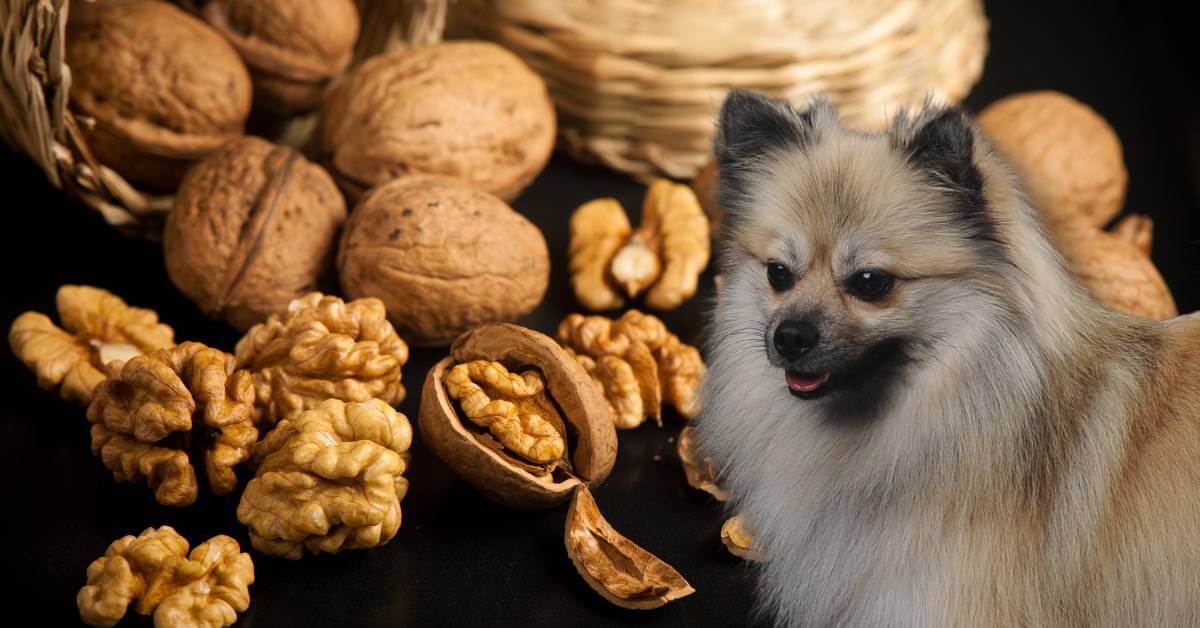Can Dogs Eat Walnuts?
Yes, dogs can eat walnuts, but they aren’t typically what we choose to share with them, as there are better nut options out there. Walnuts are safe and non-toxic to dogs, but like any other nuts, it’s only safe to give them to dogs when they are plain, without salt, spices, or chocolate. While they do contain healthy fats and nutrients, they aren’t essential to a dog’s diet.

I have a complicated and conflicted opinion when it comes to dogs and nuts. Dogs can live perfectly healthy lives without ever eating nuts, but somehow, we like to share them as if dogs need those extra healthy fats (they don’t). Peanuts are fine to share with dogs, and cashews are non-toxic to dogs as well, while pecan nuts are not recommended for dogs. With walnuts, it’s really not that clear why so many resources say you should never give them to your dog, but I’ll break it down in this article.
Are walnuts safe for dogs to eat?
Yes, regular walnuts (English walnuts) that we buy at farmers’ markets and in supermarkets, as long as they are plain and unsalted, are safe for dogs to eat, and are non-toxic. However, walnuts are still not an ideal snack for dogs.
I wrote about nuts in general and mentioned them all when I wrote about whether dogs can eat granola. Simply, their dietary needs are so much different than ours, and they can’t handle all the extra calories!
The main concern with walnuts is their fat content. Walnuts are high in healthy fats, with approximately 18 grams of fat per 1-ounce serving (about 14 halves). While healthy fats are good for us, dogs don’t need a significant amount of them in their diet. For many dogs, especially smaller breeds or those prone to weight gain, eating high-fat foods can lead to digestive upset and, over time, contribute to conditions like pancreatitis.
Another reason to be careful is the potential for mold. Walnuts, like pecans, are somehow prone to mold, and this can be a potential issue. Moldy walnuts can contain mycotoxins, which can be toxic to dogs and cause serious health issues. This is why people often panic about walnuts and other nuts. However, realistically, moldy nuts would be something most of us would notice right away due to discoloration, an unusual smell, or a visible layer of mold. We wouldn’t knowingly give moldy walnuts to our dogs, but still, I wanted to give you a heads-up.
The real danger – dogs eating walnut shells
The real danger comes when dogs accidentally eat walnut shells. The hard shells can be a serious choking hazard, especially for small or medium-sized dogs. If a dog accidentally swallows a walnut shell, it can lead to blockages in the throat or digestive tract. The sharp edges of the shell can also cause cuts or damage to the mouth, throat, or intestines, which can be painful and potentially dangerous.
If your dog has eaten shelled walnuts, it’s important to watch them closely. Symptoms of a blockage or injury to watch out for include:
If you notice any of these signs, it’s best to call your vet immediately.
If your dog doesn’t seem that unwell, you can help them deal with the situation at home. The first thing you’ll do is give them some bread or cooked pumpkin. These foods will coat the shell and make it easier for your dog to poop it out!
Can dogs eat black walnuts?
Black walnuts are a different variety from the regular English walnuts that we buy in supermarkets. Black walnuts can be found in parks, wooded areas, or even yards in regions where they naturally grow, especially in the Midwest and Eastern United States. If you’re taking your dog for a walk or allowing them to roam in areas with walnut trees, it’s important to be vigilant and ensure they don’t pick up any fallen black walnuts.
If a dog eats black walnuts, juglone can mess with their central nervous system, making them feel lethargic, vomit, or have an upset stomach. Because of this, it’s safest to keep your dog away from black walnuts altogether.
Now if your dog eats one black walnut, don’t worry that much, as one walnut won’t be immediately harmful. But, still, you need to pay extra attention and talk to your vet about this!
Love, life, and fur forever!
FAQs
Can dogs eat raw walnuts?
Yes, dogs can eat raw walnuts, but there are some things to keep in mind. Raw walnuts are safe and non-toxic when they’re plain and unsalted, but they’re high in fat, which could upset your dog’s stomach if they eat too much. Plus, raw walnuts can go bad pretty quickly or develop mold that produces harmful toxins. So, it’s a good idea to make sure they’re fresh before you share them with your dog.
Can dogs eat chocolate-covered walnuts?
No, dogs shouldn’t eat chocolate-covered walnuts at all. Chocolate is toxic to dogs because of the theobromine in it, which their bodies can’t handle. Mixing chocolate with walnuts, which already have a lot of fat, can lead to serious stomach issues or even pancreatitis. Just keep chocolate-covered treats far away from your dog. Now if they eat one or two chocolate-covered walnuts, nothing bad will happen, but don’t give this treat to your dog as it’s really bad for their health.
Can dogs be allergic to walnuts?
Yes, some dogs can be allergic to walnuts, just like with other foods. It’s not super common, but it can happen. If your dog is allergic, you might notice signs like itching, swelling, hives, vomiting, or diarrhea. If you see any of these symptoms after your dog eats walnuts, stop giving them walnuts and reach out to your vet for guidance.